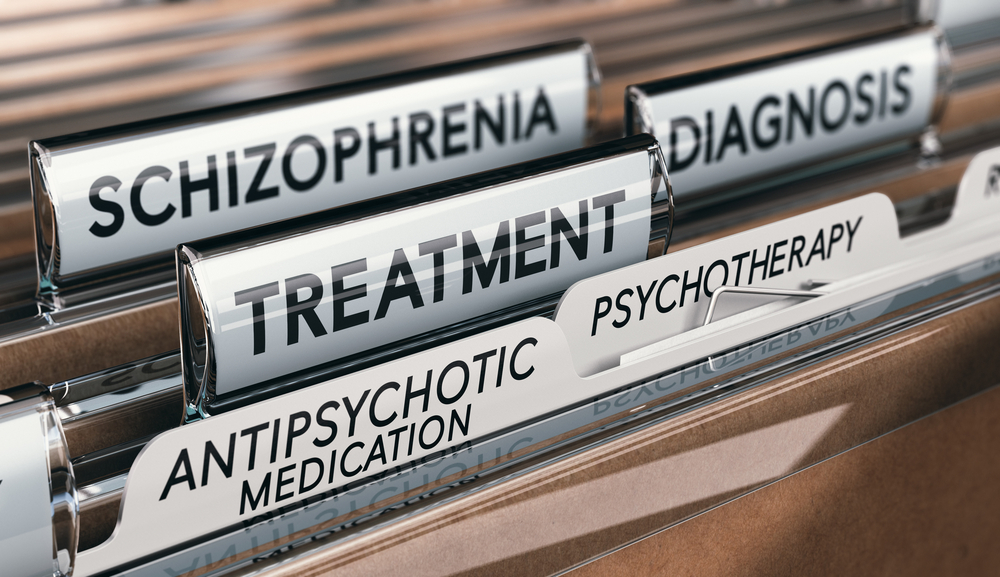Stopping antipsychotic drugs is associated with better outcomes for people diagnosed with schizophrenia, according to a new study. In the long run, those who stopped taking antipsychotics had better social functioning and quality of life and were more likely to be employed than those who continued the drugs. The study was a meta-analysis of short-term, medium-term, and long-term trials.
The study contradicts widely held beliefs that people with schizophrenia need to take antipsychotics for life and that it is dangerous for people to go “off their meds.”
Shorter-term follow-up (less than two years) also demonstrated no difference in outcomes between those who continued to take antipsychotics and those who stopped, which should call into question the need for continuing to take such drugs.
“Our results showed that whilst short-term follow-ups (<2 years) on social functioning did not yield significant differences between maintenance and discontinuation, middle- and long-term follow-ups significantly favored discontinuation,” the researchers write.
According to the researchers, a high risk of bias in the included trials reduces the quality of their results, and they advise that more high-quality research be conducted to ensure that this finding is accurate. Still, this study reflects the best evidence available on how to proceed in the long term.
The research was conducted by Björn Schlier, Laura Buck, Matthias Pillny, and others at Universität Hamburg, Germany. It was published in the Lancet journal eClinical Medicine.
















Thank you.
Report comment
Lol if only quacks like you could read the sentence in the article itself – ‘ However, the quality of evidence was rated as very low ‘
Report comment
‘ However, the quality of evidence was rated as very low ‘ – Quacks like you don’t read the entire study ?? ! And why are you deleting the comments ??
Report comment
I believe that no one knows. I take anti-pychotics. Aniti-psychotics slow down the bio-electricity in the synapse of the brain. The brain clips along at 55mph.When a person takes anti-psychotics, the brain slows to 35mph. However, the brain liked going 55mph, so, over time, it produces something to spread up the bio-electricity in the brain. But, it can add only 5mph.so,the brain stabilizes at 40mph. If the person stops taking the anti-psychotic, the brain doesn’t return to normal. Normal is 55mph. The brain goes 55mph, plus the added 5mph. It goes 60mph. No one can handle going 60mph. The person escalates, goes manic, goes manic with psychotic features, and develops a full blown psychosis. This can occur in only four days of cessation of taking the anti-psychotic. At that point, the person will need inpatient treatment. The person is shooting themselves in the foot because the former dose won’t work, and a higher dose is needed, or the person will need to switch to another type of anti-psychotic. The Psychiatrist will declare this proves that the person needs to take anti-psychotics. It does not. If a normal person is given anti-psychotics, the same thing will happen. Anti-psychotics must be reduced very very slowly. I am 65 years old. I am not a schizophrenic. My psychosis is due to taking fresh, pure LSD while attending Vanderbilt University. Chemistry students would rent out a lab, and obtain the reagents (ingredients) directly from the chemistry department. My best Psychiatrist was given LSD to determine whether or not it could be used in the treatment of the mentally ill. He could not find any use at all. However, he told me that he tried all of the anti-psychotics on me, and they did not help me at all. I have been forced to take anti-psychotics when I moved, and other doctors say that I am schizophrenic, but I am not. Few doctors will discontinue anti-psychotics, or reduce the dosage. These Psychiatrists just don’t know. Not only do anti-psychotics slow down the electricity in the brsin, but they slow down the electricity in organs, and systems in body. Because I have been forced to take anti-psychotics for many years, it would be difficult for me to function at all without them. I led a support group for the severely mentally ill for fifteen years, and can attest that going “Cold Turkey” on anti-psychotics can be disastrous. I don’t know why, but Psychiatrists simply don’t know. If patients knew about this, they would not abruptly quit anti-psychotics. This would save many dollars, and lesson the suffering of going psychotic. Anti-psychotics must be reduced very very slowly, unless the patient want to experience going totally insane. Just saying. Psychiatrists didn’t know.
Duplicate comment
Report comment
I believe that no one knows. I take anti-pychotics. Anti-psychotics slow down the bio-electricity in the synapse of the brain. The brain clips along at 55mph. When a person is given anti-psychotics, the brain slows to 35mph. However, the brain liked going 55mph, so, over time, it produces chemicals in the synapse of the brain to speed up the bio-electricity in the brain. But, it can add only 5mph So, the brain stabilizes at 40mph. If the person stops taking the anti-psychotic, the brain doesn’t return to normal. Normal is 55mph. The brain goes 55mph, plus the added 5mph. It goes 60mph. No one can handle going 60mph. The person escalates, goes manic, goes manic with psychotic features, and develops a full blown psychosis. This can occur in only four days of cessation of taking the anti-psychotic. At that point, the person will need inpatient treatment. The person is shooting themselves in the foot because the former dose won’t work, and a higher dose is required, or the person will need to switch to another type of anti-psychotic. The Psychiatrist will declare this proves that the person needs to take anti-psychotic. It does not. If a normal person is given anti-psychotics, the same thing will happen. Anti-psychotics must be reduced very very slowly. I am 65 years old. I am not a schizophrenic. My psychosis is due to taking fresh, pure LSD while attending Vanderbilt University when I was 17 years old. Chemistry students would rent out a lab, and obtain the reagents (ingredients) directly from the chemistry department. My best Psychiatrist was given LSD to test out on patients, by the government, to determine whether or not it could be used in the treatment of the mentally ill. He could not find any use at all. However, he told me that he tried all of the anti-psychotics on me, and they did not help me. I have been forced to take anti-psychotics when I moved away from this Psychiatrist, and other Psychiatrists say that I am schizophrenic, but I am not. Few doctors will discontinue anti-psychotics, or reduce the dosage. Not only do anti-psychotics slow down the electricity in the brain , but they slow down the electricity in organs, and systems in body. It is being reported that, on average, anti-psychotics take twenty years off a person’s life. Because I have been forced to take anti-psychotics for many years, it would be difficult for me to function without them. I led a support group for the severely mentally ill for fifteen years, and can attest that going “Cold Turkey” on anti-psychotics can be disastrous. If patients knew about this, they would not abruptly quit anti-psychotics. This would save many dollars, and lessen the suffering of going psychotic when a person has stopped taking their anti-psychotic “medicine.” For some, it might not be best to “arrest” a psychosis with anti-psychotics, but rather, let the disease run it’s course, and be done with it, in a safe settting. Anti-psychotics must be reduced very very slowly, unless the patient wants to experience going totally insane. Psychiatrists don’t know.
Report comment
Thanks for sharing your ideas and experiences, Paul.
Report comment
Yeah so I’m not a scientist but I’m having trouble believing this because of personal experience. Pretty sure that if my neighbor started taking antipsychotics instead of refusing to believe that she has a mental illness she would not be over here on my property threatening to kill me over a dozen times nor would she be threatening to beat my tail end. Nor would she hallucinate that I gave her my house and put no trespassing and keep out signs all over my property.
Report comment
agree 1000%
Report comment
Maybe you can try to be nice to her, maybe she would not bother you anymore.
Report comment
This is clear Liberal/Democrat none sense. Now they want the mentally ill to stop taking medications. Next thing you know, they’ll be taking our taxes and supporting two wars overseas!
Report comment
I’m a liberal Democrat but I totally disagree with this report based on lifetime experience. I thought it was written by radical Republicans!
Report comment
Indifference is the word for people who wants to keep them living in the darkness.
Report comment
Life wrecking distortions of a child’s metabolism, physical growth, and neurology can occur rapidly within weeks and months. Do NOT expose children to antipsychotics. Do NOT sentence children to such cruel fate. Mandate better records of the child’s physical, mental, neurological status and allow for transparency and corrections of the records by those who know the child best. Do not allow psychobabble to dominate assessment of the child. Facilitate interviews that empower the care givers and family to honor the unique strengths, assets of the child. Do not allow care givers to be so easily defamed by licensed professionals with conflicts of interest.
Report comment
Great post. Thank you. I agree.
Report comment